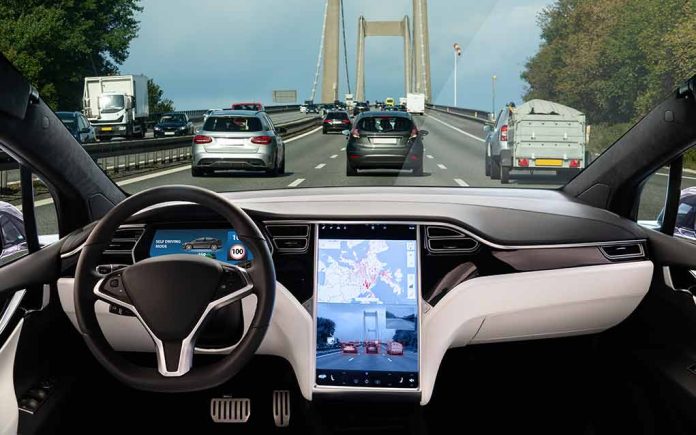
The Biden Administration has proposed banning significant vehicle software and hardware made by China on American roads, stirring significant national security and economic debate.
At a Glance
- The U.S. Commerce Department proposed prohibiting key Chinese software and hardware in connected and autonomous vehicles on American roads due to national security concerns.
- Reportedly, this regulation would effectively bar nearly all Chinese cars from entering the U.S. market.
- Concerns center around data collection by Chinese companies on U.S. drivers and infrastructure, and potential foreign manipulation of connected vehicles.
- The proposal aims to act before Chinese or Russian-linked automotive components become widespread in the U.S. market.
- The prohibitions would prevent Chinese automakers from testing self-driving cars on U.S. roads and extend to vehicle software and hardware from other foreign adversaries, including Russia.
Biden Administration’s Proposal
The Biden Administration is taking significant steps to address national security concerns by targeting Chinese-made vehicles. The U.S. Commerce Department has put forward a sweeping proposal that seeks to prohibit critical Chinese software and hardware used in American-connected and autonomous vehicles. These regulations would reportedly block almost all Chinese cars from being sold in the U.S.
Commerce Secretary Gina Raimondo emphasized the risks involved, stating that foreign adversaries could use these technologies for surveillance or even to remotely control vehicles, threatening the privacy and safety of American citizens. The initiative echoes other government actions aimed at limiting Chinese technological influence, such as the earlier bans on Huawei equipment and investigations into Chinese-made cranes at U.S. ports.
“This is not about trade or economic advantage,” U.S. Secretary of Commerce Gina Raimondo explained. “This is a strictly national security action." https://t.co/RWysue80Fv
— WPRI 12 (@wpri12) September 23, 2024
Implications and Scope
The regulation would not only prevent Chinese automakers from selling their vehicles in the U.S. but also from testing autonomous vehicles on American roads. The proposed prohibitions extend to connected vehicle software and hardware from other countries designated as adversaries, including Russia. This broad scope highlights the administration’s focus on safeguarding U.S. infrastructure and citizens from potential espionage and sabotage.
“When foreign adversaries build software to make a vehicle that means it can be used for surveillance, can be remotely controlled, which threatens the privacy and safety of Americans on the road,” Raimondo said.
Reports indicate that vehicles, now “mobility platforms,” can monitor behavior and track surroundings, significantly raising cybersecurity and privacy issues for U.S. citizens.
Timeline and Criticisms
The proposed ban aims for software restrictions to take effect with the 2027 model year, while hardware prohibitions will start in the 2030 model year or January 2029. The proposal, however, has not been without its critics. The Chinese Embassy in Washington has condemned the planned action, urging the U.S. to adhere to market principles and international trade rules, asserting that China will firmly defend its lawful rights and interests.
While there reportedly isn’t much hardware or software coming from China to U.S. markets at this time, the Alliance for Automotive Innovation argues the rule would likely leave some automakers struggling to find new suppliers. “You can’t just flip a switch and change the world’s most complex supply chain overnight,” according to alliance CEO John Bozzella.
The administration continues to emphasize that the national security concerns driving this proposal are real and pressing. The Commerce Department and other U.S. agencies are adamant about curbing the potential for foreign adversaries to exploit vulnerabilities in American infrastructure through these technologically advanced vehicles. Both industry experts and government officials agree that proactiveness in this issue is paramount for national security.
The Commerce Department wants to finalize this rule before President Biden leaves office on Jan. 20. This initiative may bring significant shifts for American drivers and the automotive market, marking another chapter in the ongoing and complex relationship between the U.S. and China.
Sources
- Biden proposes banning Chinese vehicles from U.S. roads with software crackdown
- Biden administration seeks to ban Chinese, Russian tech in US autonomous vehicles
- Biden Administration Proposes Ban on Chinese Software in Vehicles





